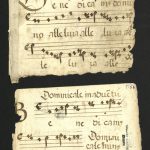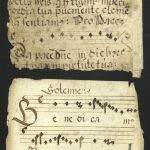The paper leaves once detached from an unknown host volume are originally from the end of an office codex (antiphonal), likely from the appendices. This is where the chants preserved on the fragment are usually placed: Benedicamus melodies closing the Vespers and suffragia for commemorations. This addenda were often were written on the empty pages of a long-finished manuscript, during the active use of the codex quasi as a testimony of use (e.g. see the Pozsony antiphonal “Knauz-3”, whose last pages similarly contain added material of this type: Štátny archív v Bratislave EC Lad.3, f. 219v–220r: http://cantus.sk/image/15298, http://cantus.sk/image/15299). Therefor it is possible, that the probably 16th-century fragment originally belonged to an earlier antiphonal. The fragment preserved Benedicamus melodies for different feasts, which are, as per usual, musically different from each other complimenting the rank of the feast. The ferial Benedicamus melodies are much more simple and use recitative melodic schemes compared to the musically more complex melodies of Eastertide, Advent and Corpus Christi, the latter even has a trope. A complete and a partial set of suffragia were preserved after the Benedicamus melodies, on the 2nd leaf’s verso. These commemorations composed of a psalmless antiphon, a versicle and a prayer were intended for good weather (pro serenitate) and for peace (pro pace). The antiphon of the pro serenitate suffragium (Conditor alme siderum), according to our current knowledge, only survived in Hungarian sources, thus its presence unambiguously sings the domestic provenance of the former codex.
Zsuzsa Czagány




